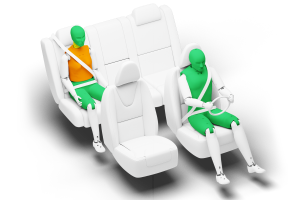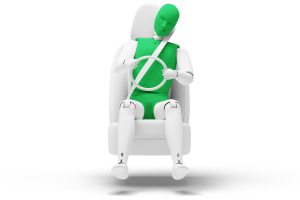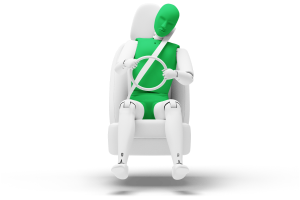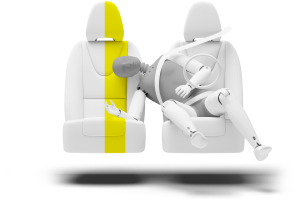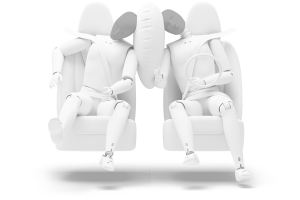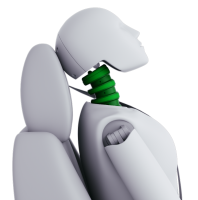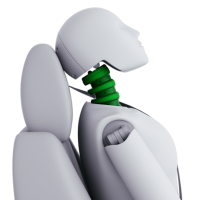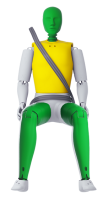2022 Jeep Cherokee
Some ratings use a scale of Poor to Good. Others range from Basic to Superior.
Small overlap front: driver-side
Rating applies to 2019-23 models built after April 2018
Tested vehicle: 2019 Jeep Cherokee Latitude 4-door 4wd
The Jeep Cherokee was re-engineered and restyled for the 2019 model year. Beginning with the 2019 model year, the A-pillars, front door hinge pillars, and door sills were modified to improve occupant protection in moderate overlap and small overlap frontal crashes.
Beginning with 2019 models built after April 2018, the driver seat belt was modified to further improve protection in small overlap frontal crashes. (Information about when a specific vehicle was manufactured is on the certification label typically affixed to the car on the driver door or adjacent B-pillar.)
Action shot taken during the driver-side small overlap frontal crash test.
The dummy’s position in relation to the door frame, steering wheel, and instrument panel after the crash test indicates that the driver’s survival space was maintained very well.
The frontal and side curtain airbags worked well together to keep the head from coming close to any stiff structure or outside objects that could cause injury.
The driver’s space was maintained well, and risk of injuries to the dummy’s legs and feet was low.
Measures of occupant compartment intrusion on driver side
| Test ID | CEN1806 |
|---|---|
| Lower occupant compartment | |
| Lower hinge pillar max (cm) | 7 |
| Footrest (cm) | 6 |
| Left toepan (cm) | 3 |
| Brake pedal (cm) | 3 |
| Parking brake (cm) | |
| Rocker panel lateral average (cm) | 3 |
| Upper occupant compartment | |
| Steering column | 1 |
| Upper hinge pillar max (cm) | 5 |
| Upper dash (cm) | 6 |
| Lower instrument panel (cm) | 4 |
Driver injury measures
| Test ID | CEN1806 |
|---|---|
| Head | |
| HIC-15 | 171 |
| Peak gs at hard contact | no contact |
| Neck | |
| Tension (kN) | 1.1 |
| Extension bending moment (Nm) | 14 |
| Maximum Nij | 0.24 |
| Chest maximum compression (mm) | 29 |
| Femur (kN) | |
| Left | 2.0 |
| Right | 1.4 |
| Knee displacement (mm) | |
| Left | 3 |
| Right | 5 |
| Knee-thigh-hip injury risk (%) | |
| Left | 0 |
| Right | 0 |
| Maximum tibia index | |
| Left | 0.44 |
| Right | 0.53 |
| Tibia axial force (kN) | |
| Left | 2.6 |
| Right | 1.7 |
| Foot acceleration (g) | |
| Left | 65 |
| Right | 46 |
Small overlap front: passenger-side
Rating applies to 2019-23 models
Tested vehicle: 2019 Jeep Cherokee Latitude Plus 4-door 4wd
The Jeep Cherokee was re-engineered and restyled for the 2019 model year. Beginning with the 2019 model year, the A-pillars, front door hinge pillars, and door sills were modified to improve occupant protection in moderate overlap and small overlap frontal crashes.
Passenger-side small overlap frontal ratings are assigned by the Institute based on a test conducted by Fiat Chrysler as part of frontal crash test verification.
Measures of occupant compartment intrusion on passenger side
| Test ID | VTP1907 |
|---|---|
| Lower occupant compartment | |
| Lower hinge pillar max (cm) | 16 |
| Footrest (cm) | 15 |
| Right toepan (cm) | 9 |
| Center toepan (cm) | 3 |
| Rocker panel lateral average (cm) | 4 |
| Upper occupant compartment | |
| Center dash (cm) | 6 |
| Upper hinge pillar max (cm) | 10 |
| Upper dash (cm) | 12 |
| Right lower dash (cm) | 12 |
Passenger injury measures
| Test ID | VTP1907 |
|---|---|
| Head | |
| HIC-15 | 147 |
| Peak gs at hard contact | no contact |
| Neck | |
| Tension (kN) | 1.1 |
| Extension bending moment (Nm) | 7 |
| Maximum Nij | 0.19 |
| Chest maximum compression (mm) | 20 |
| Femur (kN) | |
| Left | 2.3 |
| Right | 4.1 |
| Knee displacement (mm) | |
| Left | 4 |
| Right | 13 |
| Knee-thigh-hip injury risk (%) | |
| Left | 0 |
| Right | 1 |
| Maximum tibia index | |
| Left | 0.69 |
| Right | 0.76 |
| Tibia axial force (kN) | |
| Left | 2.9 |
| Right | 3.5 |
| Foot acceleration (g) | |
| Left | 58 |
| Right | 62 |
Driver injury measures
| Test ID | VTP1907 |
|---|---|
| Head | |
| HIC-15 | 132 |
| Peak gs at hard contact | no contact |
| Neck | |
| Tension (kN) | 1.4 |
| Extension bending moment (Nm) | 20 |
| Maximum Nij | 0.35 |
| Chest maximum compression (mm) | 29 |
| Femur (kN) | |
| Left | 1.0 |
| Right | 1.2 |
| Knee displacement (mm) | |
| Left | 1 |
| Right | 0 |
| Knee-thigh-hip injury risk (%) | |
| Left | 0 |
| Right | 0 |
| Maximum tibia index | |
| Left | 0.41 |
| Right | 0.41 |
| Tibia axial force (kN) | |
| Left | 0.3 |
| Right | 0.8 |
| Foot acceleration (g) | |
| Left | 30 |
| Right | 56 |
Moderate overlap front: original test
Rating applies to 2019-23 models
Tested vehicle: 2019 Jeep Cherokee Latitude Plus 4-door 4wd
The Jeep Cherokee was re-engineered and restyled for the 2019 model year. Beginning with the 2019 model year, the A-pillars, front door hinge pillars, and door sills were modified to improve occupant protection in moderate overlap and small overlap frontal crashes.
Moderate overlap frontal ratings are assigned by the Institute based on a test conducted by Fiat Chrysler as part of frontal crash test verification.
2022 Jeep Cherokee
Some ratings use a scale of Poor to Good. Others range from Basic to Superior.
Small overlap front: driver-side
Rating applies to 2019-23 models built after April 2018
Tested vehicle: 2019 Jeep Cherokee Latitude 4-door 4wd
The Jeep Cherokee was re-engineered and restyled for the 2019 model year. Beginning with the 2019 model year, the A-pillars, front door hinge pillars, and door sills were modified to improve occupant protection in moderate overlap and small overlap frontal crashes.
Beginning with 2019 models built after April 2018, the driver seat belt was modified to further improve protection in small overlap frontal crashes. (Information about when a specific vehicle was manufactured is on the certification label typically affixed to the car on the driver door or adjacent B-pillar.)
Action shot taken during the driver-side small overlap frontal crash test.
The dummy’s position in relation to the door frame, steering wheel, and instrument panel after the crash test indicates that the driver’s survival space was maintained very well.
The frontal and side curtain airbags worked well together to keep the head from coming close to any stiff structure or outside objects that could cause injury.
The driver’s space was maintained well, and risk of injuries to the dummy’s legs and feet was low.
Measures of occupant compartment intrusion on driver side
| Test ID | CEN1806 |
|---|---|
| Lower occupant compartment | |
| Lower hinge pillar max (cm) | 7 |
| Footrest (cm) | 6 |
| Left toepan (cm) | 3 |
| Brake pedal (cm) | 3 |
| Parking brake (cm) | |
| Rocker panel lateral average (cm) | 3 |
| Upper occupant compartment | |
| Steering column | 1 |
| Upper hinge pillar max (cm) | 5 |
| Upper dash (cm) | 6 |
| Lower instrument panel (cm) | 4 |
Driver injury measures
| Test ID | CEN1806 |
|---|---|
| Head | |
| HIC-15 | 171 |
| Peak gs at hard contact | no contact |
| Neck | |
| Tension (kN) | 1.1 |
| Extension bending moment (Nm) | 14 |
| Maximum Nij | 0.24 |
| Chest maximum compression (mm) | 29 |
| Femur (kN) | |
| Left | 2.0 |
| Right | 1.4 |
| Knee displacement (mm) | |
| Left | 3 |
| Right | 5 |
| Knee-thigh-hip injury risk (%) | |
| Left | 0 |
| Right | 0 |
| Maximum tibia index | |
| Left | 0.44 |
| Right | 0.53 |
| Tibia axial force (kN) | |
| Left | 2.6 |
| Right | 1.7 |
| Foot acceleration (g) | |
| Left | 65 |
| Right | 46 |
Small overlap front: passenger-side
Rating applies to 2019-23 models
Tested vehicle: 2019 Jeep Cherokee Latitude Plus 4-door 4wd
The Jeep Cherokee was re-engineered and restyled for the 2019 model year. Beginning with the 2019 model year, the A-pillars, front door hinge pillars, and door sills were modified to improve occupant protection in moderate overlap and small overlap frontal crashes.
Passenger-side small overlap frontal ratings are assigned by the Institute based on a test conducted by Fiat Chrysler as part of frontal crash test verification.
Measures of occupant compartment intrusion on passenger side
| Test ID | VTP1907 |
|---|---|
| Lower occupant compartment | |
| Lower hinge pillar max (cm) | 16 |
| Footrest (cm) | 15 |
| Right toepan (cm) | 9 |
| Center toepan (cm) | 3 |
| Rocker panel lateral average (cm) | 4 |
| Upper occupant compartment | |
| Center dash (cm) | 6 |
| Upper hinge pillar max (cm) | 10 |
| Upper dash (cm) | 12 |
| Right lower dash (cm) | 12 |
Passenger injury measures
| Test ID | VTP1907 |
|---|---|
| Head | |
| HIC-15 | 147 |
| Peak gs at hard contact | no contact |
| Neck | |
| Tension (kN) | 1.1 |
| Extension bending moment (Nm) | 7 |
| Maximum Nij | 0.19 |
| Chest maximum compression (mm) | 20 |
| Femur (kN) | |
| Left | 2.3 |
| Right | 4.1 |
| Knee displacement (mm) | |
| Left | 4 |
| Right | 13 |
| Knee-thigh-hip injury risk (%) | |
| Left | 0 |
| Right | 1 |
| Maximum tibia index | |
| Left | 0.69 |
| Right | 0.76 |
| Tibia axial force (kN) | |
| Left | 2.9 |
| Right | 3.5 |
| Foot acceleration (g) | |
| Left | 58 |
| Right | 62 |
Driver injury measures
| Test ID | VTP1907 |
|---|---|
| Head | |
| HIC-15 | 132 |
| Peak gs at hard contact | no contact |
| Neck | |
| Tension (kN) | 1.4 |
| Extension bending moment (Nm) | 20 |
| Maximum Nij | 0.35 |
| Chest maximum compression (mm) | 29 |
| Femur (kN) | |
| Left | 1.0 |
| Right | 1.2 |
| Knee displacement (mm) | |
| Left | 1 |
| Right | 0 |
| Knee-thigh-hip injury risk (%) | |
| Left | 0 |
| Right | 0 |
| Maximum tibia index | |
| Left | 0.41 |
| Right | 0.41 |
| Tibia axial force (kN) | |
| Left | 0.3 |
| Right | 0.8 |
| Foot acceleration (g) | |
| Left | 30 |
| Right | 56 |
Moderate overlap front: original test
Rating applies to 2019-23 models
Tested vehicle: 2019 Jeep Cherokee Latitude Plus 4-door 4wd
The Jeep Cherokee was re-engineered and restyled for the 2019 model year. Beginning with the 2019 model year, the A-pillars, front door hinge pillars, and door sills were modified to improve occupant protection in moderate overlap and small overlap frontal crashes.
Moderate overlap frontal ratings are assigned by the Institute based on a test conducted by Fiat Chrysler as part of frontal crash test verification.
Jeep Grand Cherokee
Full Width Rigid Barrier
Side Mobile Barrier
Side Pole
Far-Side Excursion
Occupant Interaction
Rear Seat
Front Seat
| Rescue Sheet | Available, ISO compliant | |||
| Advanced eCall | Available | |||
| Multi Collision Brake | Not available | |||
The passenger compartment of the Jeep Grand Cherokee remained stable in the frontal offset test. Protection was good for all critical body areas of both the driver and passenger. Jeep demonstrated that good protection would also be provided to the knees and femurs of occupants of different sizes and to those sitting in different positions. Analysis of the deceleration of the impact trolley during the test, and analysis of the deformable barrier after the test, revealed that the car would be an aggressive partner in a frontal collision and it was penalised accordingly. In the full-width rigid barrier test, protection of the chest of the rear passenger was marginal, based on dummy readings of chest compression. Otherwise, protection was good or adequate for both occupants. In both the side barrier and side pole tests, all critical body areas were well protected and the Grand Cherokee scored maximum points in this part of the assessment. Control of excursion (the extent to which a body is thrown to the other side of the vehicle when it is hit from the far side) was poor. The Grand Cherokee does not have a counter-measure to mitigate against occupant to occupant injuries in such impacts. Tests on the front seats and head restraints demonstrated marginal protection against whiplash injuries in the event of a rear-end collision. A geometric analysis of the rear seats indicated good whiplash protection. The Grand Cherokee has an advanced eCall system which alerts the emergency services in the event but lacks a system to prevent secondary collisions.
Jeep Cherokee
Passenger
Driver
Front Seat
Car
Pole
The passenger compartment remained stable in the frontal impact. Dummy readings indicated good protection of the knees and femurs of both the driver and passenger. Jeep showed that a similar level of protection would be provided to occupants of different sizes and to those sat in different positions. In the side impact barrier test, the Cherokee scored maximum points with good protection of all body regions. In the more severe side impact pole test, protection of the chest was adequate and that of other body regions was good. The seats and head restraints provided marginal protection against whiplash injuries in the event of a rear-end collision.
- Fitted to the vehicle as standard
- Not fitted to the test vehicle but available as option
- Not Available
| Seat Position | |||
|---|---|---|---|
| Front | 2nd row | ||
| Passenger | Left | center | Right |
| Maxi Cosi Cabriofix (Belt) | |||
| Britax Römer King Plus (Belt) | |||
| Britax Römer Duo Plus (ISOFIX) | |||
| Britax Römer KidFix (Belt) | |||
| Maxi Cosi Cabriofix & EasyFix (Belt) | |||
| Maxi Cosi Cabriofix & EasyFix (ISOFIX) | |||
| BeSafe iZi Kid X3 ISOfix (ISOFIX) | |||
| Maxi Cosi Pearl & Familyfix (ISOFIX) | |||
| Britax Römer KidFix (ISOFIX) | |||
Based on dummy readings in the dynamic tests, the Cherokee scored maximum points for its protection of both the 3 year and the 1½ year infants. Forward movement of the 3 year dummy, sat in a forward-facing restraint, was not excessive and, in the side impact, both dummies were properly contained within the protective shells of their restraints, minmising the likelihood of dangerous head contact with parts of the car interior. The airbag for the front passenger seat cannot be disabled so a rearward-facing child restraint should not be used in that seating position. The labels warning of the dangers of doing so were not permanently attached to the sun visor, so did not meet Euro NCAP’s requirements. All the types of child restraints for which the car is designed could be properly installed and accommodated in the vehicle.





